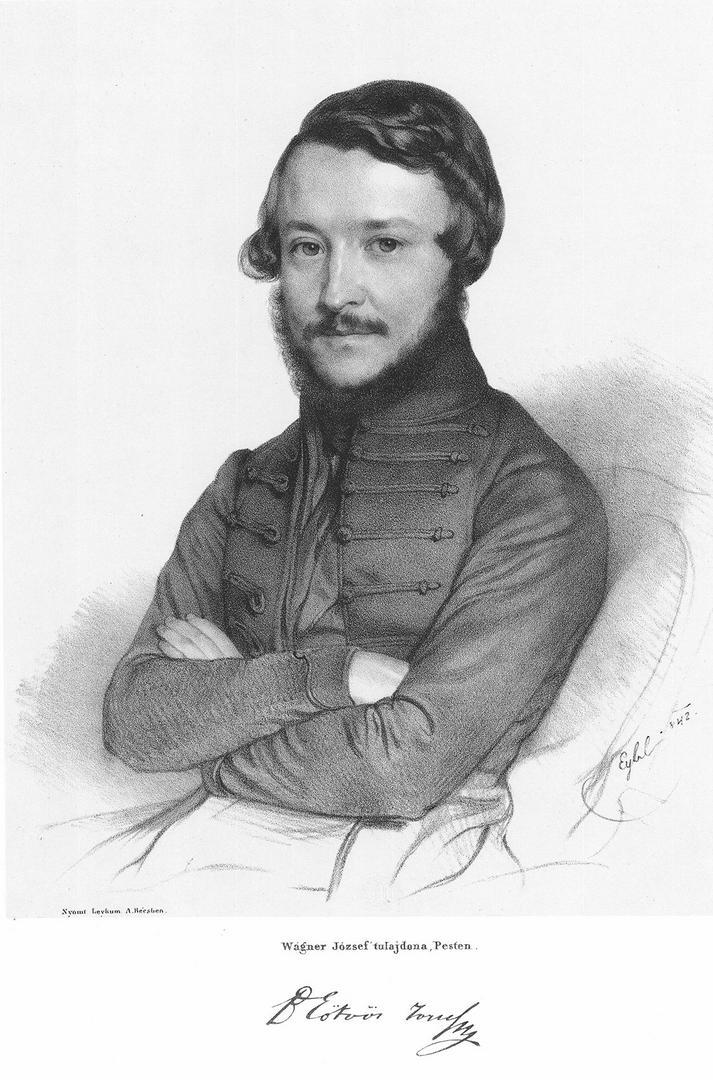About Baron József Eötvös
Baron József Eötvös (1813-1871)
 Baron József Eötvös, who gave our Research Centre its name, is a rightly- respected member of the Hungarian national pantheon. As a member of the Parliament, he undertook an active public role during the Age of Reform, nurturing the development of Hungarian civic life. He was also the minister for religious and educational affairs in the first independent Hungarian civic government led by Lajos Batthány, and was later to hold the same portfolio in the government of Gyula Andrássy following the Austro-Hungarian Compromise of 1867. Between 1866 and 1871 he was the president of the Hungarian Academy of Sciences and was president of the Kisfaludy Society for seven years (Kisfaludy Társaság). The most outstanding achievement of his second ministerial term, the National Schools Act of 1868, was exemplarily liberal-minded by the standards of the day in Europe. His name is also associated with the Act on Nationalities (Act XLIV. of 1868.), which is remembered as a modern, progressive source of law. . The passing of legislation on the emancipation of the Jews was also thanks in part to his efforts.
Baron József Eötvös, who gave our Research Centre its name, is a rightly- respected member of the Hungarian national pantheon. As a member of the Parliament, he undertook an active public role during the Age of Reform, nurturing the development of Hungarian civic life. He was also the minister for religious and educational affairs in the first independent Hungarian civic government led by Lajos Batthány, and was later to hold the same portfolio in the government of Gyula Andrássy following the Austro-Hungarian Compromise of 1867. Between 1866 and 1871 he was the president of the Hungarian Academy of Sciences and was president of the Kisfaludy Society for seven years (Kisfaludy Társaság). The most outstanding achievement of his second ministerial term, the National Schools Act of 1868, was exemplarily liberal-minded by the standards of the day in Europe. His name is also associated with the Act on Nationalities (Act XLIV. of 1868.), which is remembered as a modern, progressive source of law. . The passing of legislation on the emancipation of the Jews was also thanks in part to his efforts.
In performing his public role, which brought clear results in practice, Eötvös constantly bore in mind the goals of nation-building, the modernization of society and state and the cultivation of a middle class in Hungary, following Kölcsey’s credo of “homeland and progress”. Eötvös’s scholarly and literary work must also be mentioned here, as both his works on state theory and his works of literature form an impressive body of work. His novels include ‘The Carthusian’ the ‘Notary of the village’ and ‘Hungary in 1514’. He contributed to the development of the political science in Hungary with a two-volume work entitled ‘The dominant ideas of the 19th century and their impact on the state’, which has since become a classic. The main message of this grandiose work – and the reason for its continued relevance – is that the role of political science is chiefly to interpret the dominant ideas of the age so as to ‘reorder’ the state or in other words to reform it.
The work of József Eötvös constitutes an intellectual and quality framework for the research centre which is named after him, a yardstick against which to measure its activities. The figure of József Eötvös is exemplary to the scholars of the Centre both in terms of values and of the diversity of the work he carried out. Examples of these shared values are a commitment to the national interest, dedication towards the civic development of our home country, faith in the power of education and culture and loyalty to the noblest Hungarian traditions of 19th century liberalism. The diversity of focus is manifested in the exemplary polyphony of actions with which József Eötvös forged a legacy in the scholarship, political public life and ministerial administration, while completing his life’s work with his literary works. The quality and diversity that characterizes his life’s work sends a clear message to the Research Centre bearing his name.